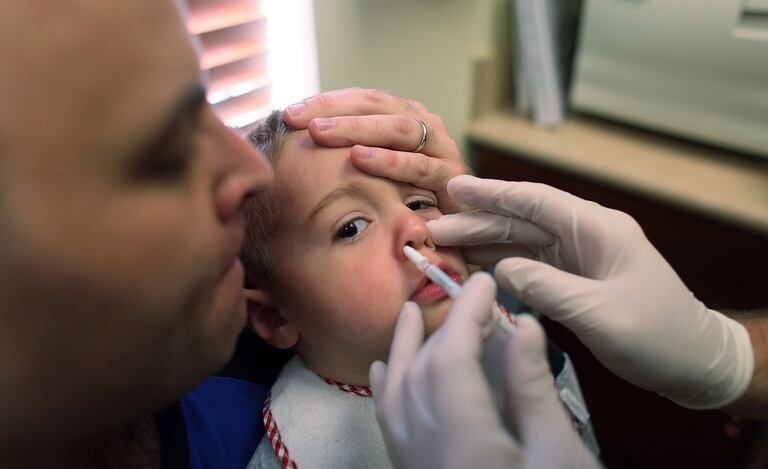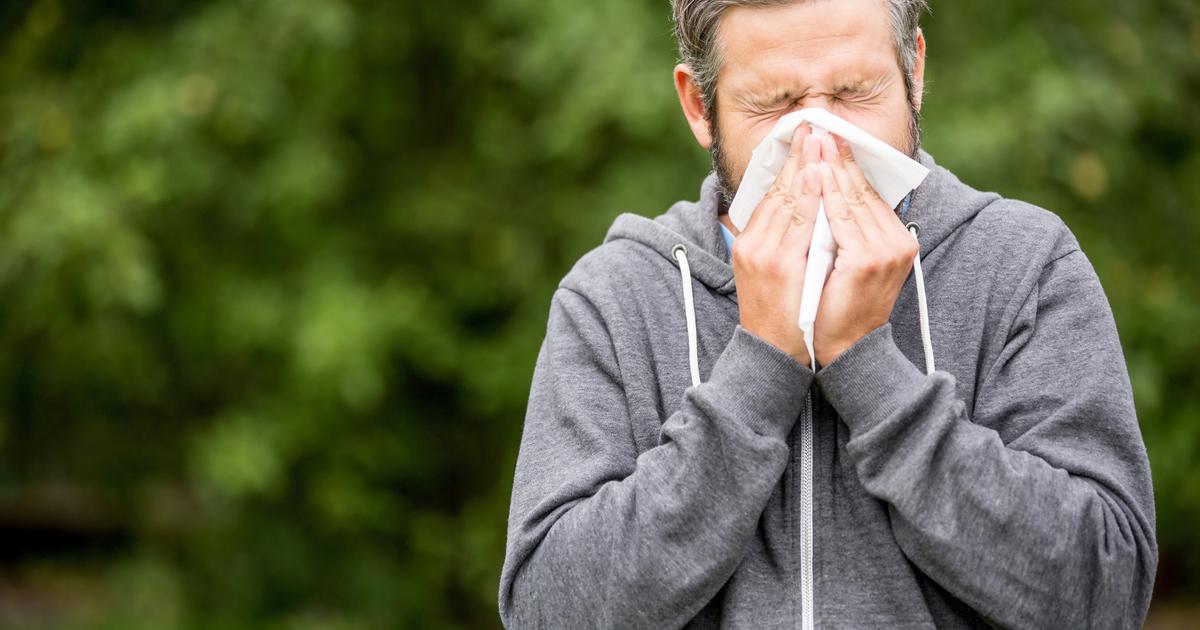A boy receives a nasal flu shot in a file image.Joe Raedle / Getty Images
The decisive battle between the new coronavirus and our body is fought in the lungs.
Advanced infection can cause the immune system to give an unbalanced response to the presence of the pathogen: the now famous cytokine storm that can end the life of the infected.
Days before all this happens there is a first contact between the virus and the body in another organ that is not paying as much attention and that could be the key to stopping an infection in its tracks: the nose.
This is where several medical teams are targeting to get antivirals and aspirated vaccines that not only save the lives of patients, but also stop the transmission of the virus.
One of the most pressing questions for the scientific community is whether the vaccines already approved cut infections.
Clinical trials have shown that the injections save from severe illness and death from covid with almost 100% effectiveness.
What is not so clear is whether a vaccinated person can continue to carry virus in their respiratory tract and transmit it to people around them.
If this is so, scientists predict that the coronavirus will stay with us forever, yes, producing only mild symptoms once the majority of the population is immunized.
In Israel, BioNTech's vaccine reduced asymptomatic infections by 89%
Some recent studies show encouraging data.
The most prominent has been held in Israel, the world leader in vaccination.
Still preliminary data from the Ministry of Health shows that the BioNTech vaccine reduced asymptomatic infections by 89%.
If the data is confirmed there would be a significant decrease in transmission.
A second work published in
The Lancet
points out that the same vaccine reduced asymptomatic cases among medical personnel by 75%.
The former head of the US drug agency, Scott Gottlieb, told CNBC this week that Janssen's vaccine has similar results, although conclusive data is lacking.
Moderna's vaccine also appears to reduce the number of asymptomatic cases, but again the data is not entirely clear.
Faced with this situation, there are scientific teams that are developing new ways to avoid contagion and to nip the chains of transmission.
It is something that can be done both with antiviral drugs that block the entry of SARS-CoV-2 into cells and with vaccines.
They both use the same form of administration: a nasal spray.
Most of the vaccines in use are given by injection into the arm, but for respiratory viruses it may make much more sense to build immunity at the pathogen's first point of contact with the body, which occurs in the lining of the nose. , the mouth and the rest of the respiratory tract.
Several flu vaccines use this method, and the oral polio vaccine — approved in 1961 and much easier to use than injected — is believed to have eradicated this crippling disease from children almost everywhere in the world.
"Available vaccines, which are administered by intramuscular injection, protect against severe COVID, but may not always prevent transmission of the virus," warns Rik de Swart, virologist at the Erasmus Medical Center in Rotterdam, the Netherlands.
"Vaccines administered to the mucosa [the nose] may be better in that regard, although it remains to be seen if they reach the market before this pandemic ends," he adds.
Aspirable treatments can be used against many respiratory viruses
Swart's team has designed an antiviral that is administered through the nose and that blocks the entry of the virus into cells.
The researchers gave the spray to ferrets - animals that suffer from human-like COVID - and put them in a cage for a day with another already infected animal.
The results, published in
Science
, are striking.
There was not a single contagion among the treated animals, while all those that did not receive the drug became infected.
"Our goal is to develop this antiviral for this pandemic, but first we must show that it is safe and effective in humans," explains De Swart.
The tactic of this drug "is the same as for many other respiratory viruses, so it could also be used as a rapid response in other pandemics," he adds.
"Our ability to develop these antivirals is based on several decades of study on how related viruses bind to and penetrate cells," explains Anne Moscona, a microbiologist at Columbia University (USA), a pioneer of these antivirals along with his colleague Matteo Porotto.
Several companies are developing nasal vaccines for covid.
Among the more than 170 candidates in development, there are at least four that are nasal and are in the early stages of human testing.
Already in October, US scientists demonstrated in mice that a single dose of a nasal vaccine is capable of reducing COVID the same as two doses of conventional vaccine and also avoiding infections almost 100%.
"To end the pandemic, we must be able to stop transmission and this type of vaccine can achieve it," explains Michael Diamond, an immunologist at the University of Washington in St. Louis (USA), who has led the preclinical development of this vaccine.
Although their development starts with a slight disadvantage, these vaccines can still be useful if they demonstrate efficacy, for example as a childhood vaccine or as a booster dose, Diamond argues.
The Indian company Bharat has acquired the patent for this immunization and the first phase of human trials is about to begin.
One of the most interesting points according to the president of the company is that it is only one dose and does not require syringes, a considerable saving, since India would need 2.6 billion of them to immunize its entire population.
Enigmas about the origin of the pandemic
"These types of vaccines are much easier to administer and possibly generate less rejection in some people," says José Manuel Martínez, a researcher at the University of Santiago de Compostela, whose team is developing a vaccine against covid that may be administered via nasal.
Martínez's team begins preclinical trials in mice next week, to be carried out at the Helmholtz Center for Infectious Research (HZI) in Germany.
There they will test the immune response of the animals to different forms of administration and then decide whether to proceed with the nasal vaccine.
These types of immunizations may be late in this pandemic, but only in the developed world.
"Developing countries could take advantage of this type of injection," says Martínez.
Nasal vaccines promote the production of a type of antibody known as immunoglobulin A, a different molecule from the one that boosts already approved vaccines, immunoglobulin G. organs;
it attacks at the entrance and could prevent the transmission of the virus ”, explains Marcos López, president of the Spanish Society of Immunology.
"It is possible that there will not be time to develop these vaccines for this pandemic, but they will serve to refine and improve the ones we already have," he explains.
“This virus is probably going to be endemic and will have to be vaccinated every few years.
These vaccines would be useful to refine and improve the immunizations that we already have.
They are going to be necessary ”, he concludes.
You can follow
MATERIA
on
,
,
or subscribe here to our
Newsletter
.









